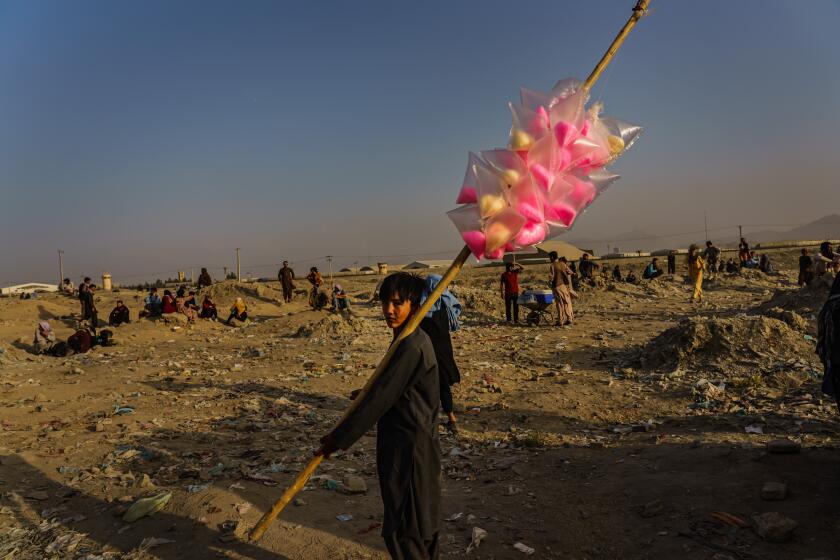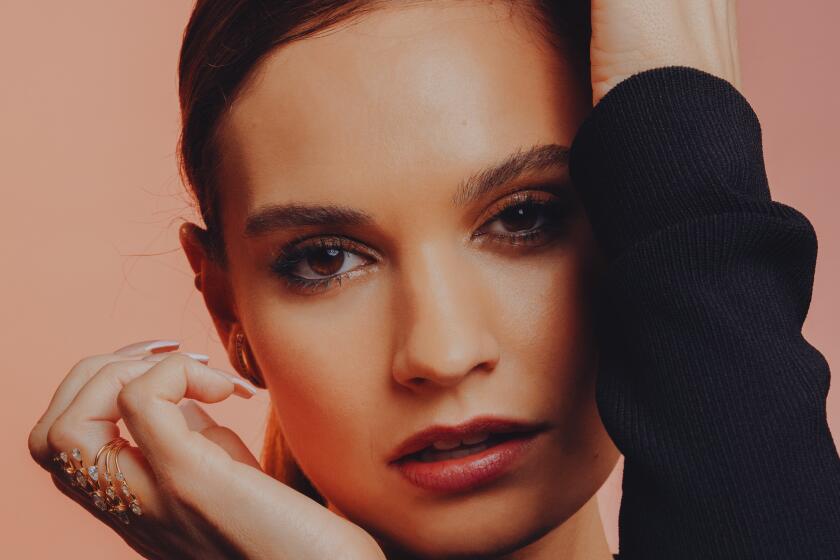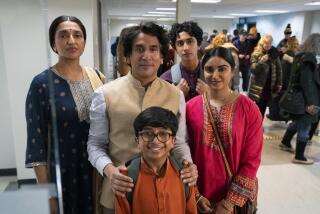Many of the world’s marriages are arranged. A new rom-com hopes to represent them

LONDON — When English screenwriter and producer Jemima Khan moved to Lahore, Pakistan, with then-husband Imran Khan — who later became the country’s prime minister — she was forced to confront her preconceived notions about Pakistani culture, including the tradition of arranged marriage. In the course of a decade there, the subject seeped in —to the point that she made it the heart of her new film, “What’s Love Got to Do With It?”
“I went with all the same myths and misconceptions that people who haven’t ever come across anybody who’s had an arranged marriage before might have,” Khan says. “I felt that it was an outdated idea that really doesn’t belong to the modern world. It could not possibly, in any way, be romantic or genuinely successful. I was the only love marriage in my ex-husband’s entire family history.”
The longer she spent there, though, the more Khan’s expectations were confounded. She watched happy couples come together, thanks to an introduction by their loved ones. After returning to England following her divorce, Khan began to consider the different ways in which love presents itself.
“If you took the component of chemistry out of it and someone else chose for you, who do you think you might end up with?” she reflects. “That became the basic premise for a film. I was interested in exploring the idea of too little choice and too much choice. We have a tendency in the West to assume that our way is superior and to look down on other ways of finding lasting love. But having had that experience of living there, it slightly changed my perspective.”
Netflix’s “Indian Matchmaking” gestures at, but rarely delves into, the social pressures of the arranged marriage system. Ask someone who’s been through it.
Those ideas evolved into a screenplay, which Khan spent nearly a decade developing. During her time as a journalist for the New Statesman, Khan wrote an article about arranged marriage in England, and later made a radio show about it. Her research also involved interviews with dozens of British Pakistani men in their 20s and 30s who had experienced an arranged marriage, most of whom she found via Twitter.
“I interviewed them about their motivations and why they’ve come to what might be perceived as a very surprising decision,” Khan says. “I also did a load of interviews, across all age groups, of married couples who’d had arranged marriages.”
The result, “What’s Love Got to Do With It?” centers on Zoe (Lily James), a white British woman obsessed with dating apps, and her British Pakistani friend, Kaz (Shazad Latif), who agrees to let his family procure him an arranged marriage. Zoe decides to make a documentary about the marriage, following Kaz and his family through the process. The London-set story reflects on the challenges of finding a relationship, regardless of one’s cultural background.
“In writing it, I didn’t take a position on which version is best and which one is worse,” Khan notes. “It’s simply: There are lots of ways to find love, in the end.”
Although the film has been marketed as a rom-com — and it shares attributes of some popular British classics — Khan didn’t approach the story as such. Once director Shekhar Kapur came on board, he focused on grounding the drama in reality, which was helped by the fact that Latif and James are actually old friends.
“To me, it was about very real people,” Kapur says. “So when I sat with the actors and we rehearsed, I just said, ‘Find yourselves in these characters.’ The problem with categorizing it as [a] rom-com is you fall into the trap and the actors fall into the trap, and then they start to perform like it’s a rom-com. No, you don’t. Life itself has its funny parts.”
Latif, who is of Pakistani and British heritage, had experience with many elements of the story, which helped him connect to Kaz.
“It was a world I immediately understood,” he says. “It felt nice to do family scenes where [they are] sitting around eating curry and discussing things. That was an exciting thing for me, personally, but also the fact that it was a love story with an Asian man as a rom-com lead — that doesn’t happen very often.”
From ‘Shock and Awe’ to the death of Bin Laden, U.S. networks treated the war as a distant spectacle. Overseas, it was brutally, frightfully close.
In the film, Kaz’s family refers to arranged marriage as assisted marriage, a more modern term. His parents, Aisha (Shabana Azmi) and Zahid (Jeff Mirza), take him to a matchmaker (Asim Chaudhry), who suggests he needs to find “a companion, not a click.” Although the process may be unfamiliar to Western audiences, Khan notes that arranged marriage remains prevalent around the world.
“Arranged marriage sometimes gets conflated with forced marriage, but I see them as different things,” Khan explains. “Forced marriage categorically has no place in the modern world. But what came to be known [in] my in-laws’ world as an assisted marriage was essentially an introduction by the people who love you and know you best.”
“There’s no judgment of it,” adds Kapur, an Indian director who was born in Lahore shortly before the Partition. “I do know people that have had arranged marriages that worked brilliantly. And many that don’t.”
For Latif, it was important not to embody a stereotypical version of a Pakistani character or to play into misconceptions about Kaz’s culture.
“It’s about showing both sides and showing it not in the typical way we think about arranged marriage,” he says. “Trying to open people’s eyes up a little bit to this more modernized version. There’s a whole generation of South Asians, my cousins included, who are trying to find different ways of doing it — as are a whole bunch of Westerners with the dating apps. There are a lot more similarities than differences, I think, because everyone just wants to find love.”
In general, Khan wanted to portray Pakistan as a “fun and vibrant and colorful” place, rather than a dark and dangerous one, as it’s often presented in Hollywood. The story moves from London to Lahore, where the characters attend a lively wedding celebration. While the interiors were shot in the U.K., the exteriors were helmed on location by filmmaker Sharmeen Obaid-Chinoy, who directed the second unit.
“Doing a rom-com about Pakistan does seem slightly counterintuitive if you only know about Pakistan from the news,” Khan says. “But people who know Lahore are familiar with the idea that a Pakistani party can be wilder than any party I’ve been to in London.”
“Lahore is very beautiful,” Kapur adds. “There’s a great disconnect because the narrative for too long has flown from Hollywood. Hollywood has developed very, very great stereotypes of what the East is, and that narrative needs to be checked.”
Eager to shed her ‘likable’ image, the Brit signed on to play a woman whose private life went very public. Then the tabloid spotlight shined on her.
Behind the scenes, Khan and Kapur ensured that there were people of Pakistani heritage in every department. Kaz’s match, Maymouna, is played by Sajal Aly, an actor and model who is famous in Pakistan. The filmmakers even tapped musicians Nitin Sawhney and Naughty Boy to create an original song for the Lahore wedding, which featured Rahat Fateh Ali Khan (who, coincidentally, played Khan’s own wedding).
“I really loved how the song brought together so many different talents from South Asia,” Khan notes. “That, I hope, is what the film does generally.”
Regardless of whether it’s categorized as a rom-com or not, “What’s Love Got to Do With It?” offers representation not often found in Hollywood love stories. For Latif, the existence of Kaz, a charismatic doctor who drives the film’s plot, offers hope.
“Growing up, this isn’t something I would have seen much of,” the actor says. “For me, it’s just nice to think some young brown guys out there might be watching it one day and see themselves onscreen.”
More to Read
Only good movies
Get the Indie Focus newsletter, Mark Olsen's weekly guide to the world of cinema.
You may occasionally receive promotional content from the Los Angeles Times.












